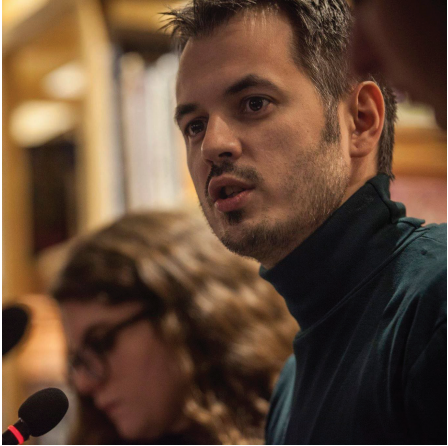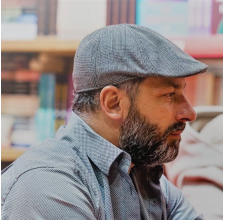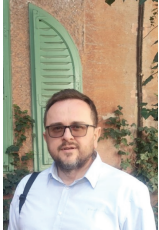Agon Maliqi is a policy analyst, civil society activist and media writer from Prishtina, Kosovo. Maliqi’s main interests include regional and international affairs, the state of human rights and
democracy in the Balkans and socioeconomic development in Kosovo. Professionally, Maliqi has during the past ten years worked mostly as a consultant on these issues with a
range of international organisations. He was recently in Washington D.C as a Reagan-Fascell Democracy Fellow at the National Endowment for Democracy (NED). He graduated in Political Science and European Studies from the American University in Bulgaria in 2006, and obtained a Master’s Degree in International Development Policy from Duke University (USA) in 2012.
The Western Balkans remain stuck in a context of what I have previously called an illiberal equilibrium.[1] None of the countries has been able to complete the post-communist transition successfully by becoming true liberal democracies, but remain some type of hybrid regime. In these types of systems, there is a semblance of liberal democracy and political competition, but independent institutions are mostly not independent, media freedoms remain limited, while patronage networks and oligarchs have excessive power over distribution of resources. As a result, political competition remains largely controlled and the citizenry disempowered.
The key bottleneck in the Western Balkans that feeds this political context are the lingering territorial and ethnic disputes. They create fertile ground for authoritarian leadership and entry points for external authoritarian powers to assert influence over societies as external patrons. All of the countries in region (save for Albania) have an ethnic or bilateral dispute of some sort that has gained prominence as a topic in the current geopolitical context. The unresolved bilateral disputes and the incomplete security architecture fuel authoritarianism by keeping identity politics at centre stage. They enable authoritarian rulers to instrumentalize security fears and identity cleavages to their advantage.
The modus operandi is that of using (or even engineering) moments of escalated tensions (real or simulated) to widen cleavages and framing choices. Authoritarian politicians portray themselves as protectors keeping domestic or external enemies at bay, while also splitting any liberal-minded opponents along identity lines. The other part of the story is that the threat of security crisis buys Balkan leaders Western support at the expense of democratic standards.
This is not to say that security dilemmas which regional leaders are confronted with are not real. Russian disruption efforts are real and nationalist projects and threats remain potent. Yet these are at the same time often too convenient in building a useful narrative and instigating fear, coercion and ultimately the legitimation of strongman rule.
This broader contest has impacted the context in which civil society operates, as well as its effectiveness in tackling the threats towards democracy. Advocacy-type NGOs played a key role in promoting democratic reforms during the transition era in Eastern Europe. These CSOs continue to do very valuable and courageous work in raising awareness on sensitive issues. They also continue to generally be seen as an “undesired actor” and in some cases there are still classical attempts to intimidate and delegitimize them (by both government and oppositions) due to foreign funding.
Yet formal types of restrictions and intimidations do not seem to be the key problem in the Western Balkans as they are in other more authoritarian corners of the world. The bigger problem is that CSOs are undermined more subtly through irrelevant forms of inclusion and co-option that create the perception of meaningful influence, as well as by use of the increasingly weightless EU integrations process as a smokescreen. Government openness to CSOs varies across countries and most Western Balkan countries have developed frameworks for CSO participation in various decision-making processes and councils. But the participation remains symbolic and non-influential, does not include critical voices or it effectively fakes debates to tick the boxes of EU conditionality.
Most of the challenges facing advocacy CSOs are nonetheless the result of their own long-time structural weaknesses. Much of the sectors’ problems are old – financial sustainability, absorption capacity, fragmentation, low level of institutionalization, etc. Most importantly, these types of NGOs have rarely built strong grassroots constituency. The “business model” of the transition-era in which policy advocacy CSO by and large have turned into donor-driven private companies with weak connections to either grassroots or to relevant stakeholders from public and private sector, has also provided leverage to the governments, which filled the financing gaps through public funding.
On most issues and in many of the researched countries, governments have created or have co-opted CSOs to become government-controlled NGO-s (GONGOs) that stimulate civic role in public discourse or for foreign audiences. In Serbia, for example, new organisations regularly appear that have similar names to established organisations and produce counter statements to critical CSOs to drown them out. Authoritarian regimes in the Balkans also seek to limit the space for civil society actors in the media.
Another phenomenon observed to have weakened the effectiveness of CSOs in many countries – for example Albania, North Macedonia, Kosovo and Serbia – is that political parties regularly recruit civil society representatives for political roles, with the ultimate impact being increased delegitimization and perception of CSOs as a stepping-stone for politics; the depletion of CSO from capacities and; a less critical voice by those who remain in the sector towards governments with former CSO representatives.
What seems to have given a knockout punch to advocacy type CSOs is the collapse in the credibility of EU conditionality, which currently provides the operating and funding framework for democratization reforms. This framework has become detached from results. Perhaps the key challenge undermining the effectiveness of traditional advocacy CSOs is that the remaining source of democratization funding is attached to the EU accession framework at a time when EU conditionally policy is failing and has lost credibility.
Traditional CSOs increasingly work on technocratic issues or promote a symbolic pro-EU discourse that fails to produce tangible results to citizens and even increasingly get delegitimized when the benefits do not arrive and the EU does not deliver. For example, the EU accession framework has failed to produce better democratic outcomes in Serbia or in Montenegro, it faced considerable challenges in opening accession talks for Albania and North Macedonia, while in Kosovo the EU has failed for a long time to deliver on visa liberalization despite conditions being fulfilled. The end result is that there is now considerable backlash, demoralization and a sense of frustration (even betrayal) towards Western countries by some of the most pro-democracy segments of society.
This has occurred either because of failure to deliver on EU conditionality promises (e.g. North Macedonia, Kosovo), or because of the continued prioritization of security concerns over democratization (e.g. Serbia and Montenegro) that gave a free pass to leaders for lagging democratic reforms. While the EU is the biggest donor to civil society, it is also the culprit of much of its current ineffectiveness due to the way the funding is managed – namely, by disregarding smaller organizations, deciding without meaningful consultations with the civil sector and in many cases obliging CSOs to engage with government, thus limiting their critical potential.
While in most countries there is extreme disenchantment with civic activism, civic space
is being rejuvenated by new forms of issue-based and informal grassroots groups that show
considerable potential in disrupting the status-quo – yet they too face considerable limitations. Throughout the region there has been an emergence of the new model of civil society centred around narrow or broad social movements with on and off voluntary and sporadic engagements that often start through social media or direct people-to-people appeals. The new actors are citizens who want to dedicate some of their time to civic initiatives but do not operate in structured organizations, which are most often not registered, and do not engage in traditional fundraising with donors.
In fact, it seems like the new civil society actors have grown not only as a response to failures by political elites, but also in reaction towards traditional CSOs, which in many societies are seen as representing more elite and donor interests. These new actors and movements are particularly effective as informal campaigners for local issues or specific themes like environmental pollution, infrastructure projects, corruption scandals, gender issues, etc.
Due to dissatisfaction with opposition parties, some of the grassroots initiatives in the region
grew to larger protest movements that created problems for the government, or even became political movements that won local elections (in Zagreb).
Yet the problem with these movements is that they are usually horizontal and non-institutionalized and as a result can wither away quickly and can’t outsmart elites in the political game. Some of them often face legitimacy and authenticity questions because they act as auxiliary movements to opposition parties. In some countries these movements are in fact reactionary groups promoting illiberal ideas, often funded by malign actors from authoritarian regimes. Or they may be a bit of both, as anti-corruption and pro-transparency bring together people with diverse views – e.g. in Serbia, where pro-Western liberals march with nationalists and Russian sympathizers.
Still, the grassroots movements have shown a potential to build pro-democracy narratives and revive a spirit of civic activism that seems to have been lost since the start of the transition. What they need is new methods to build leverage in society and expand the constituencies of people who care about democracy and human rights. Most importantly, what they need is to disrupt the current “securitisation” of public narratives by governing elites which seek to amplify ethnic and state divisions. And that among other things requires civil society in the region to work cross-borders.
[1] https://bridge-magazine.net/?p=539







